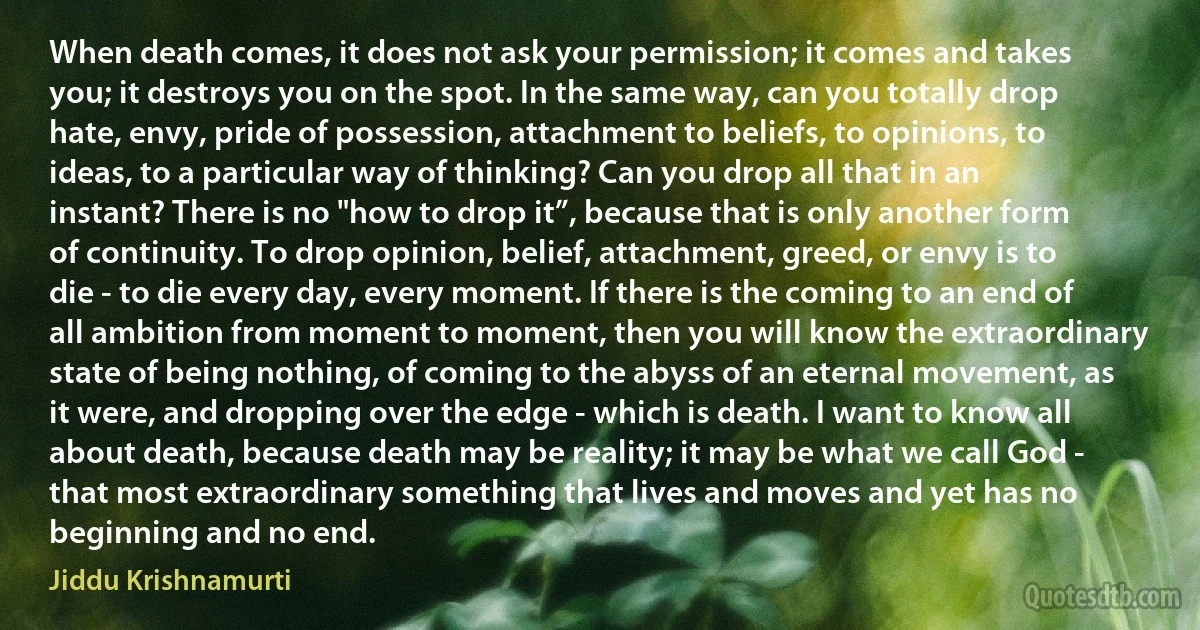Envy Quotes - page 26
The Devil endeavours by every means to keep men in error, in the enticement of the passions, in darkness of mind and heart; in pride, avarice, covetousness, envy, hatred, wicked impatience and irritation; in evil despondence, in the abominations of fornication, adultery, theft, false-witness, blasphemy, negligence, slothfulness, and sluggishness.

John of Kronstadt
Yet, when we must put aside our wrath, quench our envy, soften our anger, offer our prayers, and show a disposition which is reasonable, mild, kindly, and loving, how could poverty stand in our way? For we accomplish these things not by spending money but by making the correct choice.

John Chrysostom
Why are we free-traders? ... We are satisfied that it is right because it gives the freest play to individual energy and initiative and character and the largest liberty both to producer and consumer. We say that trade is injured when it is not allowed to follow its natural course, and when it is either hampered or diverted by artificial obstacles. ... We believe in free trade because we believe in the capacity of our countrymen. That at least is why I oppose protection root and branch, veiled and unveiled, one-sided or reciprocal. I oppose it in any form. Besides we have experience of fifty years, during which our prosperity has become the envy of the world.

Henry Campbell-Bannerman
Arrogance attracts hatred and envy. Elegance arouses respect and Love. Arrogance causes us to humiliate our fellow man or woman. Elegance teaches us to walk in the light. Arrogance complicates words, because it believes that intelligence is only for the chosen few. Elegance transforms complex thoughts into something that everyone can understand.

Paulo Coelho
Keeping out of the primaries puts Kennedy in situation the other candidates may well envy. One or another of them may well capture a useful number of first ballot delegate commitments by winning a string of victories in the 22 state primaries to be held next year, but it is also possible that no one candidate can dominate this extraordinary proliferation of quirky and minor‐issue‐oriented contests. And possible too that the primaries will generate such fierce rivalries that the party bosses will be forced to select a nominee from among those who remained aloof, on the theory that only such a candidate would have a chance of uniting the party in time to do battle with the Republicans. Kennedy, of course, would be an obvious choice in such a situation, especially since he alone among the Democrats does not need the primaries to prove his votegetting ability; his remarkable standing in the polls is proof of that.

Ted Kennedy
The reason death sticks so closely to life isn't biological necessity - it's envy. Life is so beautiful that death has fallen in love with it, a jealous, possessive love that grabs at what it can. But life leaps over oblivion lightly, losing only a thing or two of no importance, and gloom is but the passing shadow of a cloud.

Yann Martel
If, from the idea of motherland, you take away covetousness, hatred, envy and vainglory; if you take away from it the desire for predominance by violence, what is there left of it?
It is not an individual unity of laws; for just laws have no colors. It is not a solidarity of interests, for there are no material national interests - or they are not honest. It is not a unity of race; for the map of the countries is not the map of the races. What is there left?
There is left a restricted communion, deep and delightful; the affectionate and affecting attraction in the charm of a language - there is hardly more in the universe besides its languages which are foreigners - there is left a personal and delicate preference for certain forms of landscape, of monuments, of talent. And even this radiance has its limits. The cult of the masterpieces of art and thought is the only impulse of the soul which, by general consent, has always soared above patriotic littlenesses.

Henri Barbusse
America has entered one of its periods of historical madness, but this is the worst I can remember: worse than McCarthyism, worse than the Bay of Pigs and in the long term potentially more disastrous than the Vietnam War.
The reaction to 9/11 is beyond anything Osama bin Laden could have hoped for in his nastiest dreams. As in McCarthy times, the freedoms that have made America the envy of the world are being systematically eroded. The combination of compliant US media and vested corporate interests is once more ensuring that a debate that should be ringing out in every town square is confined to the loftier columns of the East Coast press.

John le Carré
Of the many monks who had thronged the church, the dormitories and study-rooms, there were two, remarked by all, whom all were watching - Abbot Daniel and the teaching novice, Narziss, only recently entered in the novitiate, yet already, against all tradition, and because of his exceptional gifts, employed, in Greek especially, as a teacher. These two, the novice and the abbot, were respected and heeded by all the house. They were watched and aroused curiosity, admired and envied, slandered in secret. Ch. I.

Hermann Hesse
It is perhaps a fact, that to the truly good, life, and the ways of men, and goodness itself, are very simple things. What to others appeared as her virtuousness, was to her merely her state of being. She did not set out to be good. She was good naturally, as another breathed. Hate and bitterness and envy and despair, those four envenomed serpents gnawing the livers of mankind, could not get in at her. But to herself she was nothing special; only herself to herself.

Tanith Lee
People sometimes say that they envied the Communists because they were so "sure." In my case this was not exactly it; I was sure, too, intellectually speaking, as far as I went. That is, I had a clear mind and was reasonably honest, while many of the Communists I knew were pathetically fogged up. In any case, my soul was not particularly hot for certainties.

Mary McCarthy
I mean not to boast; I would not excite envy, but manly emulation. We have all one common cause; let it, therefore, be our only contest, who shall most contribute to the security of the liberties of America. And may the same kind Providence which has watched over this country from her infant state still enable us to defeat our enemies!

John Hancock
The centre of the town was swathed in red flags. It was my first demonstration and one that I remember to this day. The city was Lahore, which for many centuries had been a much envied metropolis in Northern India. Then the last conquerors had departed, leaving behind a divided subcontinent. The old town had become part of a new country – Pakistan. The founder of this state, Mohammed Ali Jinnah, an agnostic, had cynically used religion to create a ‘Muslim nation'. Jinnah had expressed the hope that Pakistan would, despite everything, remain a secular state, but the logic of history had proved fatal. All the Hindu and Sikh families in Lahore had fled across confessional frontiers. Little ‘Lahores' had sprung up in Delhi.

Tariq Ali
O my boy! thou hast been to me like a man who took a stone, and threw it up to heaven to stone his Lord with it. And the stone did not hit, and did not reach high enough, but it became the cause of guilt and sin.
O my boy! if thou hadst honoured me and respected me and hadst listened to my words thou wouldst have been my heir and wouldst have reigned over my dominions.
O my son! know thou that if the tail of the dog or the pig were ten cubits long it would not approach to the worth of the horse's even if it were like silk.
O my boy! I thought that thou wouldst have been my heir at my death; and thou through thy envy and thy insolence didst desire to kill me. But the Lord delivered me from thy cunning.

Ahiqar
Reverence for greatness dies out, and is succeeded by base envy of greatness. Every man is in the way of many, either in the path to popularity or wealth. There is a general feeling of satisfaction when a great statesman is displaced, or a general, who has been for his brief hour the popular idol, is unfortunate and sinks from his high estate. It becomes a misfortune, if not a crime, to be above the popular level.
We should naturally suppose that a nation in distress would take counsel with the wisest of its sons. But, on the contrary, great men seem never so scarce as when they are most needed, and small men never so bold to insist on infesting place, as when mediocrity and incapable pretence and sophomoric greenness, and showy and sprightly incompetency are most dangerous.

Albert Pike
Miss Taggart, do you know the hallmark of the second-rater? It's resentment of another man's achievement. Those touchy mediocrities who sit trembling lest someone's work prove greater than their own-they have no inkling of the loneliness that comes when you reach the top. The loneliness for an equal- for a mind to respect and an achievement to admire. They bare their teeth at you from out of their rat holes, thinking that you take pleasure in letting your brilliance dim them-while you'd give a year of your life to see a flicker of talent anywhere among them. They envy achievement, and their dream of greatness is a world where all men have become their acknowledged inferiors. They don't know that that dream is the infallible proof of mediocrity, because that sort of world is what the man of achievement would not be able to bear.

John Galt



